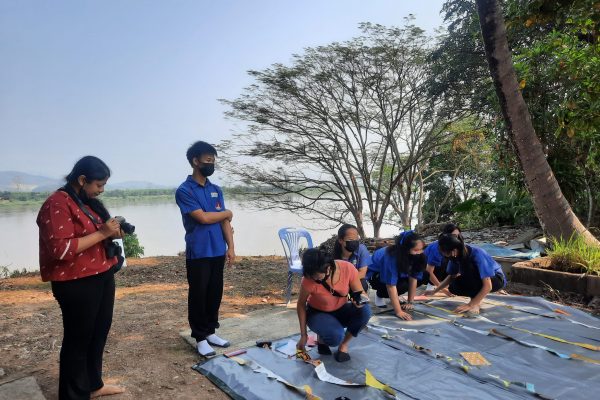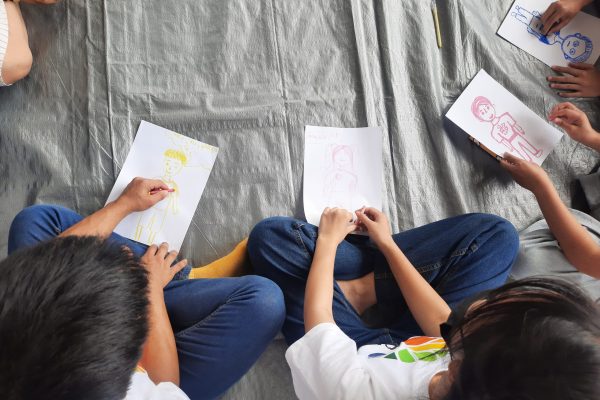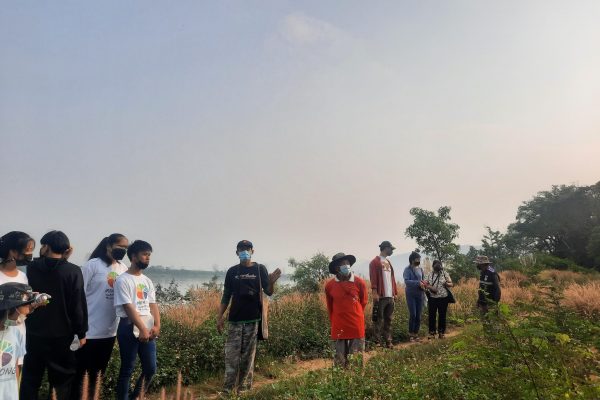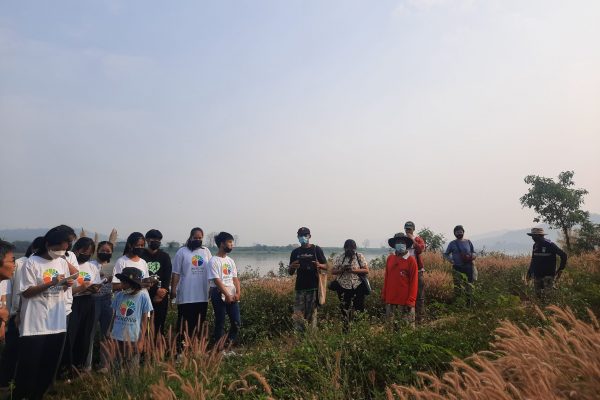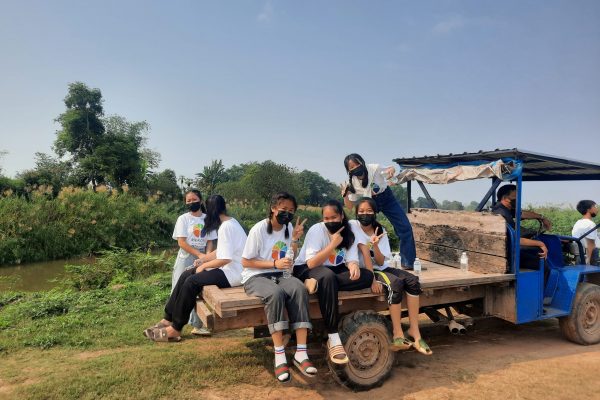9-10th March, 2022
Healing Café, Ban Pong Khong, Chiang Saen District
The second Mekong Dam Monitor event was held on March 9-10, 2022 at the Healing Café in Ban Pong Khong, Chiang Saen District, Chiang Rai. In this activity, our team was able to relay knowledge about the website monitor.mekongwater.org to local students. This website is useful as a reference resource for students to undertake educational projects on the Mekong River and its tributaries. In addition, we had an activity where students were able to design a Mekong River tributary learning project. By using a process called 5P, students began to think about issues or topics of interest, which can lead to the creation of projects that will benefit both oneself and the public.
We had activities to study and explore nature in the community, and to practice observing the physical characteristics of the area, society, culture, and environment in the area, which were used to map the community. Also in this activity, “Kru Tee” – Niwat Roykaew from the Mekong School and Mr. Charoen Thammarat, the local knowledge keeper of Ban Pong Khong were invited to speak. They invited the students to sit back while they told stories of the past, about the way of life, and the village’s connection with the river to impart knowledge of the impacts of development and what remains with this great river on the students who attended.
Kru Tee described the big picture of the Mekong River – that it is a large and very long river that flows through many countries, with an abundance of fish species. It is a large river, with large physical characteristics, many people with differences in language and culture still rely upon it for their livelihoods, which has resulted in a civilization in the Mekong River Basin, such that the people of each country depend on the river.

”If our brothers and sisters don't help each other, it will be a danger to the river. In addition, the actions of human beings have not such a small effect - like throwing garbage into the river. It is not just the garbage from the community, but also the garbage from the large cargo ships.
- Kru Tee

As for Mr. Charoen Thammarat, he said that when he was a La-on (as a child) in Baan Saew, he often went to play in the Mekong River. But at that time, the river was not as big as it is now – you could use a boat to cross between the Thai-Lao sides. After that, he got married and has stayed at Baan Pong Khong until now. In those days, the area of Baan Pong Khong was like a city, because there was a large market. The boats that sailed from Chiang Saen to Chiang Khong would stop here, and as a result, the atmosphere was very lively.
Father Charoen was also a fisherman. The fish he caught, sold and ate helped him to send his children to school until they could graduate and get a job, too. In the past, the fish were quite abundant and traded for 6 baht per kilo, but now the price has increased to 120 baht. They were so abundant in the past that soon after lowering his fishing net, he had been able to eat for the day already. The fish used to be frequent such as Mekong stingrays and other big fish like Mekong Giant catfish “Pla Buk” (Pangasianodon gigas) and Giant pangasius “Pla Lerm” (Pangasius sanitwongsei), which is different from today in that there are almost no fish for the villagers to catch.
”In the past, you could drink the water from the Mekong River. But now, no matter how clear it is, I can't drink it anymore. An old man once said that the Mekong River was a big pot of medicine, but now it has become a pot of poison. Part of this comes from the use of chemicals in agriculture, because it flows into all of the rivers.
- Mr. Charoen Thammarat
They said that the river has already begun to change, to be truly unnatural. When it is the dry season it does not rain, but the water rises back up more than a meter. This unnatural tide affects the ecosystem, causing fish to disappear and riverbanks to collapse. There are many things that change the Mekong River, especially large-scale development projects that result from policies and international treaties, such as building dams to use for electricity. Especially if more dams are built, this will interfere with the spawning of fish. Because many fish in the Mekong are migratory fish, when there is a dam, the fish cannot come up the river to spawn. Therefore, all kinds of fish in the Mekong River have decreased. There has also been blasting of islands and rapids in the Mekong River so that it can be used as a maritime shipping route.
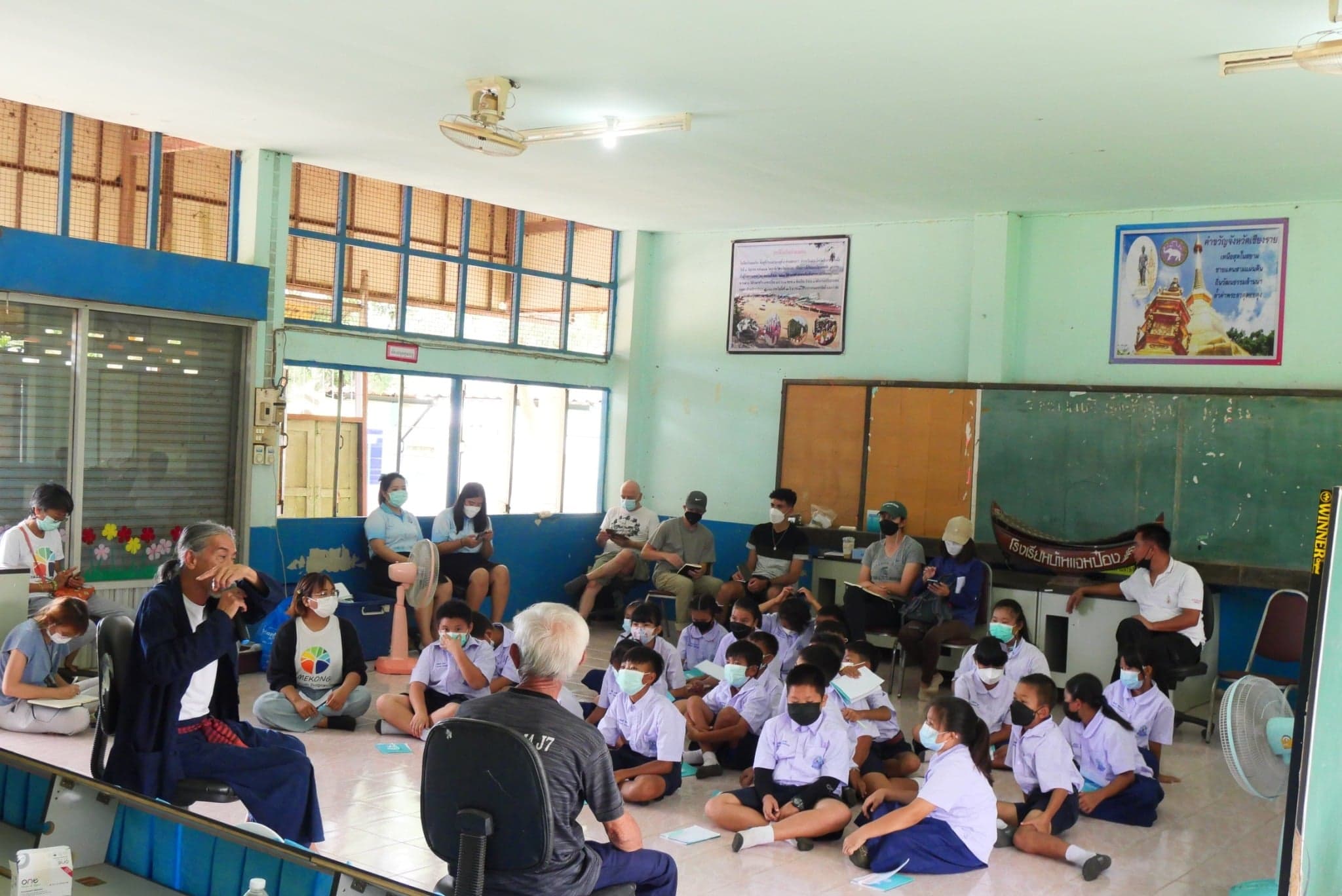
Kru Tee concluded that, “Everything that had been told, I wanted to tell everyone because the Mekong River is an important, valuable, resource, that has benefits for many people. If you want to eat fish, you don’t have to raise it because the Mekong River has already done it for you. But, people have not maintained the sources of their own livelihood. Like Gai – it’s a plant that doesn’t need to be planted, it occurs spontaneously on rocks. When it’s time, the river will grow it out for us to eat and sell. This is what nature gives to humans. But some things it could maintain on its own are being destroyed by people’s ignorance and greed. If we have knowledge, understanding, and know that it’s important, we can tell people who don’t know yet, especially people in our own hometown who are able to play a part in keeping the resources intact.”


